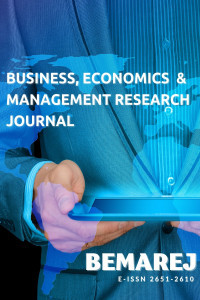Farklı disiplinlerde kavramsal farklılaşma: Sürü davranışı
Sürü Davranışı, Sürü Psikoloji, Google Trends.
Conceptual differentiation in different disciplines: Herd behavior
Herd Behavior, Herd Psychology, Google Trends,
___
- Aktan, C. C. (2018). Yeni iktisadi okulları ve iktisadi düşünce. Seçkin Yayıncılık.
- Altunöz, U., & Altunöz, H. (2018). Davranışsal ekonomi (nörofinans). Seçkin Yayıncılık.
- Arıkan, B. (2020). Türkiye pay piyasalarında sürü davranışı: Pay senedi beta katsayılarına dayalı ampirik bir analiz. (Yüksek lisans tezi). Dumlupınar Üniversitesi Lisansüstü Eğitim Enstitüsü, Kütahya, Türkiye.
- Bandwagon Effect. (2022, Mart 7). https://www.investopedia.com/terms/b/bandwagon-effect.asp
- Banerjee, A. V. (1992). A simple model of herd behavior. The Quarterly Journal of Economics, 107(3), 797-817.
- Braha, D. (2012). Global civil unrest: contagion, self-organization, and prediction. Plos One, 7(10), e48596.
- Burke, C. J., Tobler, P. N., Schultz, W., & Baddeley, M. (2010). Striatal BOLD response reflects the impact the of herd information on financial decision. Frontiers in Human Neuroscience, 4(48). https://doi.org/10.3389/fnhum.2010.00048
- Choi, H., & Varian, H. (2012). Predicting the present with Google Trends. Economic Record, 88(1), 2-9. https://doi.org/10.1111/j.1475-4932.2012.00809.x
- Coşkun, E. A. (2021). Rasyonel birey düşüncesinin evrimi ve bilişsel kısayollar. Bankacılık Dergisi, (116), 55-80.
- Dennis, N. (2017). Trading biases: Herd behaviour and the bandwagon effect. (2022, Ağustos 3). https://capital.com/trading-biases-herd-behaviour-and-the-bandwagon-effect
- Della Penna, N. & Huang, H. (2010). Constructing consumer sentiment index for US using Google searches. Department of Economics, (26).
- Devenow, A., & Welch, I. (1996). Rational herding in financial economics. European Economic Review, 40(3-5), 603-615. https://doi.org/10.1016/0014-2921(95)00073-9
- Döm, S. (2003). Yatırımcı psikolojisi. Değişim Yayınları.
- Google Trends. (2022, Ocak 1). https://trends.google.com/trends/?geo=TR1
- Herding behaviour, economics help. (2022, Mart 7). https://www.economicshelp.org/blog/ 137494/concepts/herding-behaviour/
- Kaizoji, T. (2000). Speculative bubbles and crashes in stock markets: An interacting-agent model of speculative activity. Physica A: Statistical Mechanics and its Applications, 287(3-4), 493-506. https://doi.org/10.1016/S0378-4371(00)00388-5
- Katı, M., & Selek, S. (2011). Search frequencies of some medical terms in internet: Google trends analysis. Harran Üniversitesi Tıp Fakültesi Dergisi, 8(3), 86-88.
- Kholodilin, K. A., Podstawski, M., & Siliverstovs, B. (2010). Do Google searches help in nowcasting private consumption? A real-time evidence for the US. KOF Swiss Economic Institute Working Paper, (256). http://dx.doi.org/10.2139/ssrn.1615453
- Kitapcı, İ. (2017). Rasyonaliteden irrasyonaliteye: Davranışsal iktisat yaklaşımı ve bilişsel önyargılar. Maliye Araştırmaları Dergisi, 3(1), 85-102.
- Kocabıyık, T., Teker, T., & Aksoy, E. (2020). Google Trends “dolar” aramaları ile dolar kuru arasındaki ilişkinin keşfi. IBAD Sosyal Bilimler Dergisi, (6), 258-271.
- Korkmaz, İ., & Dal, N. E. (2020). Kıtlık teorisi ve bandwagon etkisi çerçevesinde Covid-19 salgınının tüketici davranışı açısından incelenmesi. Avrasya Sosyal ve Ekonomi Araştırmaları Dergisi, 7(11), 88-125.
- Leibenstein, H. (1950). Bandwagon, Snob, and Veblen Effects in the theory of consumers' demand. The Quarterly Journal of Economics, 64(2), 183-207. https://doi.org/10.2307/1882692
- Muchnik, L., Aral, S., & Taylor, S. J. (2013). Social influence bias: A randomized experiment. Science, 341(6146), 647-651. DOI: 10.1126/science.1240466
- Nuti, S. V., Wayda, B., Ranasinghe, I., Wang, S., Dreyer, R. P., Chen, S. I., & Murugiah, K. (2014). The use of Google Trends in health care research: A systematic review. PloS one, 9(10), e109583. https://doi.org/10.1371/journal.pone.0109583
- Ortiz-Martinez, Y., & Rios-González, C. M. (2017). Global impact of the world hepatitis day 2016: An evaluation using Google Trends. Journal of Infection and Public Health, 10(5), 690-691.
- Preis, T., Moat, H. S., & Stanley, H. E. (2013). Quantifying trading behavior in financial markets using Google Trends. Scientific Reports, 3(1), 1-6.
- Raafat, R. M., Chater, N., & Frith, C. (2009). Herding in humans (PDF). Trends in Cognitive Sciences, 13(10), 420-428. https://doi.org/10.1016/j.tics.2009.08.002
- Rook, L. (2006). An economic psychological approach to herd behavior. Journal of Economic Issues, 40(1), 75-95. https://doi.org/10.1080/00213624.2006.11506883
- Samirkas, M. C. (2020). Google aramaları ile bitcoin fiyatı arasındaki ilişkinin tespiti. PressAcademia Procedia, 11(1), 67-72.
- Sönmez, L., Göçer, Ş., & Karaca, S. S. (2021). Hisse senedi piyasasında sürü davranışı: Borsa İstanbul’da spor kulüpleri üzerine bir uygulama. Danışma Kurulu, 167.
- Sürü psikolojisi (Bandwagon effect) nedir?. (2022, Mart 3). https://www.halildurmus.com/ 2021/03/01/suru-psikolojisi-bandwagon-effect-nedir/
- Ulusoy, T., & Civek, F. (2021). Determining the effect of emotional intelligence in investment decisions in sustainable finance. Social Mentality and Researcher Thinkers Journal, (52), 2830-2836.
- Vosen, S., & Schmidt, T. (2011). Forecasting private consumption: Survey‐based indicators vs. Google Trends. Journal of Forecasting, 30(6), 565-578. https://doi.org/10.1002/for.1213
- Yayın Aralığı: Yılda 3 Sayı
- Başlangıç: 2018
- Yayıncı: Engin ÇAKIR
İklim değişikliğine karşı merkez bankalarının dönüşümü: Yeşil merkez bankacılık
Farklı disiplinlerde kavramsal farklılaşma: Sürü davranışı
Fatih KONAK, Funda CİVEK, Esra ÖZKAHVECİ
Cari işlemler dengesi ve ekonomik büyüme: Türkiye üzerine ampirik bir uygulama
Aslı YENİPAZARLI, Burcu KARACA
Lucky NUGROHO, Erik NUGRAHA, Ahmad BADAWİ
Kripto para piyasasında spekülatif balonlar: Bitcoin’den kanıtlar
Yapısal kırılmalar altında bebek ölüm oranını etkileyen faktörler: Afrika ülkelerinden kanıtlar
Hava sıcaklığının BİST TÜM Endeksi fiyatları üzerindeki etkisi: İstanbul ili örneği
Batuhan MEDETOĞLU, Yusuf Bahadır KAVAS
